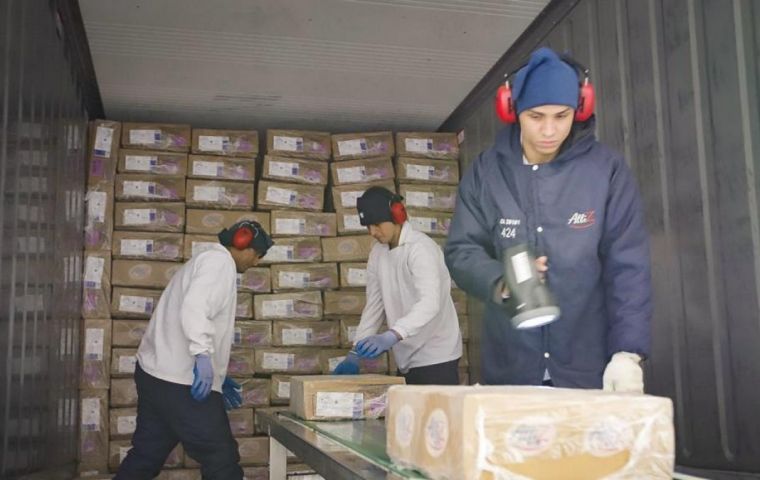MercoPress. South Atlantic News Agency
Brazilian meat plants perfect “coronavirus breeding centers”, according to Labor Ministry
 Representing perfect coronavirus “breeding centers”, some of Brazil’s biggest meat plants have been a crucial source of the spread of the disease
Representing perfect coronavirus “breeding centers”, some of Brazil’s biggest meat plants have been a crucial source of the spread of the disease Meat plants have been a major factor in the spread of coronavirus in at least three different regions of Brazil, according to the country’s experts. According to the new study conducted by the federal prosecution department the Public Ministry of Labour (MPT), the conditions at the meat plants have directly contributed towards the rapid transmission of the virus.
The findings come as the country reaches nearly 2 million confirmed cases of infection and over 72,000 deaths, coming in second only to the United States on both figures.
Representing perfect coronavirus “breeding centers”, some of Brazil’s biggest meat plants have been a crucial source of the spread of the disease. Like the outbreaks recorded in slaughterhouses all over the world, many of the worst seen in the United States, the reasons behind the danger of meat facilities are related to overcrowded working conditions, workforces made up primarily of migrant workers or marginalized communities living in communal or cramped housing, and that many factories have remained open.
“There is a direct relationship,” commented Ernesto Galindo, a researcher involved in a study for the MPT, which found that Covid-19 infections in central and southern Brazil were most severe in towns where meat workers live and work.
Backed by the country’s far-right president Jair Bolsonaro, who has dismissed the coronavirus as a “little flu” despite falling victim to the virus himself, Brazil’s powerful meat agribusiness sector has done little to protect its workers. As of the end of June, over 4,900 meat workers have tested positive at 32 different plants in the state of Rio Grande do Sul alone, representing a third of the cases in the region.
Driven by the industry’s thirst for profit, many factories have stayed open despite workers reportedly feeling unwell and only shutting down temporarily when infections are confirmed. According to the Brazilian Confederation of Agriculture and Livestock (CNA), the country’s beef sector alone is worth US$26 billion, while the chicken sector is worth another US$8 billion, making it among the most lucrative industries in the region.
One of the meat plants owned by JBS, the world’s biggest beef firm, saw almost a quarter of its 4,000 employees testing positive for the virus. But instead of ordering a full closure, only those who tested positive were suspended from work, while the remainder of the workforce continued to operate the plant.
Another JBS-owned plant in the remote town of São Miguel do Guaporé had to be ordered by a judge to shut down even after a second wave of infections swept the factory. One worker in this particular plant revealed he was forced to work even as he felt sick, and was only allowed to be sent home after he produced a positive test result.
“It reached a point I couldn’t stand it anymore. I told my superior I was not well,” he told reporters. “His focus was the cows, not the employees, it was production.”
The latest news of the clear link between meat factories and coronavirus outbreaks in Brazil is yet another instance of the dangers of the meat industry.




Top Comments
Disclaimer & comment rulesCommenting for this story is now closed.
If you have a Facebook account, become a fan and comment on our Facebook Page!